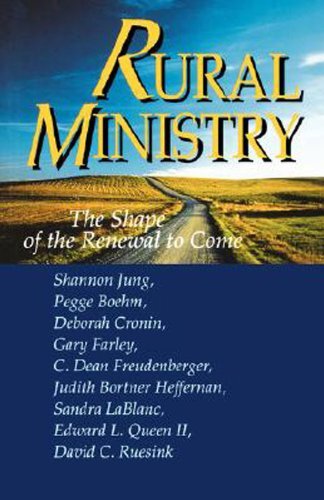L. Shannon Jung, et al., Rural Ministry: The Shape of Renewal to Come. Abingdon, 1998.
Companion volumes:
Referenced in: Small Church Leadership
LifeandLeadership.com Summary
This collection of articles is an inter-denominational effort by leaders of rural ministries, most of whom are associated with the Center for Theology and Land, as pastors, farmers, directors of rural ministry centers, denominational officials, seminary professors, etc. Authors include Shannon Jung, Pegge Boehm, Deborah Cronin, Dean Freudenberger, Gary Farley, Judith Heffernan, Sandy LaBlanc and Edward Queen.
“Our purpose here is straightforward: We believe God is calling rural churches to a new vision, a transformation of character that is evangelistic, missional, and deeply satisfying. Rural ministry confronts the central challenges of our era: the changing world economic order, the globalization and questionable sustainability of the world’s food supply, the environmental crisis and controversies, racism and migration, equitable access to social and public services, and – most centrally – the question of how we can live together, community. God is calling rural parishes to be witnesses to the resurrection, to promote reconciliation between enemies, to care for the life of the world, and the salvation of our own souls and those of others.” (9-10)
With this vision in mind, the authors passionately discuss their perception of the situation in rural America and the Christian foundations and perspectives that inform the new vision. Conservative and evangelical practitioners may not always agree with the vision completely, but reading this text will expose any rural minister to some of the larger current issues and how rural churches may be uniquely positioned to advance kingdom values in the real lives their churches and communities. It provides an important broadening of the missional horizon.
From the Publisher
The authors of Rural Ministry: The Shape of the Renewal to Come name the primary issues that leaders of Protestant and Catholic churches must ponder: the graying of the rural population; the closing of schools, hospitals, and factories; the corporate buyout of farms during the farm crisis of the 1980s; and the changing face of poverty in rural areas. In addition to telling the history of the rural church, the authors offer a compelling vision of how the church must work for justice and change in and beyond rural communities. They point to the hopeful sign of cooperative parishes and collaborative ministries in rural America, ventures whose participants represent a broad spectrum of theological and denominational perspectives. In sidebars throughout the book they employ the stories of rural clergy and laity to illustrate the distinctive opportunities and obstacles to the church’s ministry in rural areas. Written for pastors, lay leaders, denominational workers, and others, Rural Ministry will be essential reading for all who are concerned for the health and thriving of the rural church.
***For additional information on this resource, including reviews, click the bookstore links. Check the reference at page top or the links below for resource guides on related topics.***
See Resources on Over 100 Areas of Ministry Leadership:


